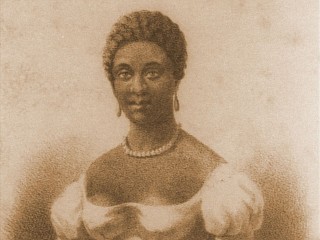
Phillis Wheatley biography
Date of birth : 1753-01-01
Date of death : 1784-12-05
Birthplace : Gambia
Nationality : American
Category : Arts and Entertainment
Last modified : 2010-10-01
Credited as : Poet, ,
20 votes so far
In 1761, a frail child of seven or eight years, Phillis Wheatley came to America by slaveship from Senegal and was auctioned to Mrs. John Wheatley, wife of a prosperous Boston tailor. The Wheatleys and their children, Mary and Nathaniel, found Phillis, as they named her, highly intelligent and responsive. Mary taught Phillis to read and write. She read the Bible, Alexander Pope's translations of Homer, the Latin classics, books on mythology, and the English poets. At 13 she wrote her first poem.
Menial tasks were not expected of Phillis. She accompanied the family on social occasions, although she asked to eat at a table separate from the other guests. She kept writing supplies by her bed so that she could write at all times. She was raised a strict Congregationalist and at 18 belonged to the Old South Meeting House, though ordinarily slaves were excluded from church membership. In 1773 she was formally freed.
Never very strong, Wheatley was sent with Nathaniel to England for her health in 1773. There her Poems on Various Subjects, Religious and Moral was published, dedicated to her hostess, the Countess of Huntington. Another volume was planned, but the Revolutionary War prevented its appearance. Her trip was cut short by the sudden illness of Mrs. Wheatley, who died in 1774.
Wheatley married John Peters, a free black man who had several trades but was unable to support her. After her husband deserted her and their two children, she worked for room and board in a boarding house. She died penniless in Boston on Dec. 5, 1784.
The poetry in Poems on Various Subjects is imitative and conventional. Wheatley's attitudes are deeply religious. The poetry is often elegaic. Her first poem, "On the Death of the Reverend Mr. George Whitefield" (1770), commemorates the English evangelist so instrumental in the Great Awakening. Her poems often honor a person or an occasion: "His Excellency, General Washington" (1775) prompted a personal note from Washington. Some subjects are general--"On Recollection," "On Imagination," "On Virtue"; others retell stories from Ovid or the Bible.
Wheatley evidently did not preserve her African heritage. Saunders Redding said her work had a "negative, bloodless, unracial quality" and seemed "superficial, especially to members of her own race." Apparently, her only memory of Africa was of her mother at dawn pouring water in a ritual to the rising sun. Strikingly, there is scarcely a Wheatley poem that does not celebrate the rising sun. She repeatedly rejoices that "darkness ends in everlasting day." She interprets her slavery and her "darkness" (note the italicized words in the following) as typical of all mankind: "On Death's domain intent I fix my eyes,/ where human nature in vast ruin lies." She, an "Ethiop," has experienced "those dark abodes" and that "Egyptian gloom" that make her so fully appreciate freedom's "genial ray."
















